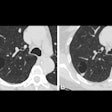Lung cancer patients 65 and older who undergo surgery for the disease are living longer than ever, according to a large analysis of patients published May 5 in Annals of Thoracic Surgery.
Data on the life expectancy of more than 26,000 patients who underwent surgery for lung cancer were analyzed by researchers from Emory University and several other centers. They combined information from the Society of Thoracic Surgeons' General Thoracic Surgery Database (GTSD) with claims data from the U.S. Centers for Medicare and Medicaid Services (CMS) (Ann Thorac Surg, May 5, 2017).
Median survival of stage I patients after having lung cancer surgery was 6.7 years, and it was 3.5 years for those with stage II disease, 2.4 years for stage III, and 2.2 years for stage IV. In addition, the five-year survival rate for selected older patients treated with surgery was 29.9% for stage III disease and 26.7% for stage IV, the researchers found.
Meanwhile, the U.S. National Cancer Institute estimates the five-year survival of all U.S. patients diagnosed with lung cancer at about 17%. Fewer than half of all patients who undergo surgery for lung cancer survive as long as five years.
"This greater than expected survival in older patients selected for operative therapy is noteworthy, especially considering that the prevalence of lung cancer is expected to increase as the population continues to grow older and more people survive into old age," said lead author Dr. Felix Fernandez from Emory.
The number of elderly individuals in the U.S. is expected to nearly double from 43 million in 2012 to 80 million by 2050, according to the U.S. Census Bureau.



















